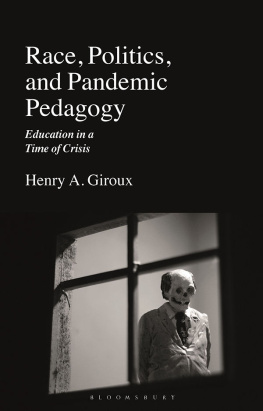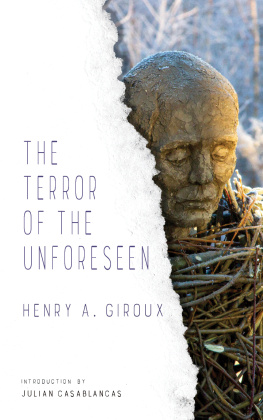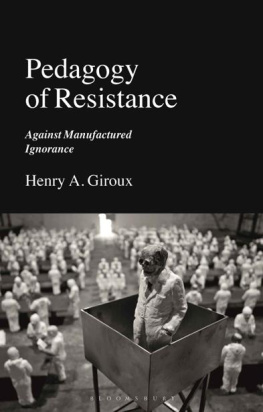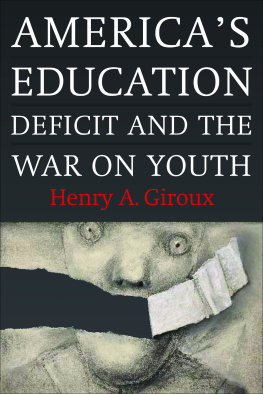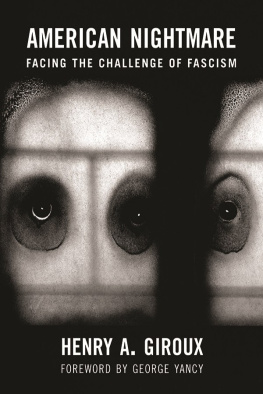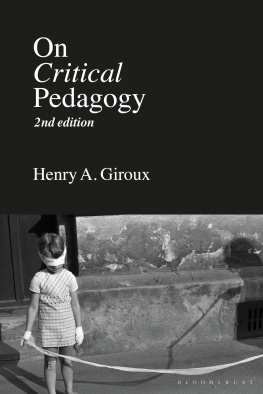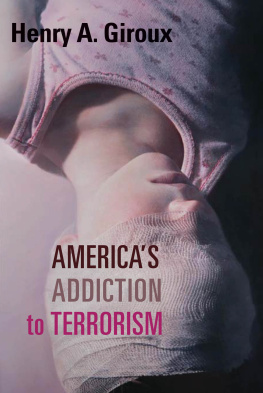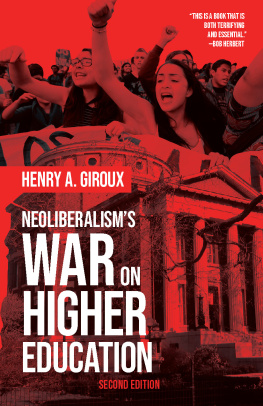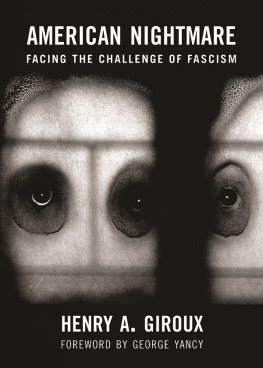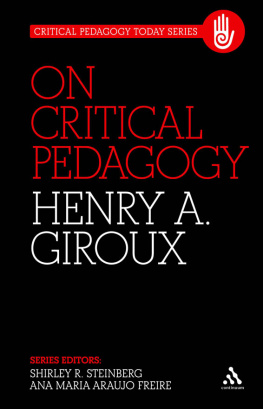Henry A. Giroux - Race, Politics, and Pandemic Pedagogy
Here you can read online Henry A. Giroux - Race, Politics, and Pandemic Pedagogy full text of the book (entire story) in english for free. Download pdf and epub, get meaning, cover and reviews about this ebook. year: 2021, publisher: Bloomsbury Publishing, genre: Politics. Description of the work, (preface) as well as reviews are available. Best literature library LitArk.com created for fans of good reading and offers a wide selection of genres:
Romance novel
Science fiction
Adventure
Detective
Science
History
Home and family
Prose
Art
Politics
Computer
Non-fiction
Religion
Business
Children
Humor
Choose a favorite category and find really read worthwhile books. Enjoy immersion in the world of imagination, feel the emotions of the characters or learn something new for yourself, make an fascinating discovery.
- Book:Race, Politics, and Pandemic Pedagogy
- Author:
- Publisher:Bloomsbury Publishing
- Genre:
- Year:2021
- Rating:3 / 5
- Favourites:Add to favourites
- Your mark:
- 60
- 1
- 2
- 3
- 4
- 5
Race, Politics, and Pandemic Pedagogy: summary, description and annotation
We offer to read an annotation, description, summary or preface (depends on what the author of the book "Race, Politics, and Pandemic Pedagogy" wrote himself). If you haven't found the necessary information about the book — write in the comments, we will try to find it.
Race, Politics, and Pandemic Pedagogy — read online for free the complete book (whole text) full work
Below is the text of the book, divided by pages. System saving the place of the last page read, allows you to conveniently read the book "Race, Politics, and Pandemic Pedagogy" online for free, without having to search again every time where you left off. Put a bookmark, and you can go to the page where you finished reading at any time.
Font size:
Interval:
Bookmark:
Race, Politics, and Pandemic Pedagogy
Also Available from Bloomsbury
On Critical Pedagogy, 2nd edition by Henry A. Giroux
Pedagogy of the Oppressed by Paulo Freire
Pedagogy of Hope by Paulo Freire
Education for Critical Consciousness by Paulo Freire
Pedagogy of the Heart by Paulo Freire
Pedagogy in Process by Paulo Freire
Race, Politics, and Pandemic Pedagogy
Education in a Time of Crisis
Henry A. Giroux

Dedication
For Rania who inspired my faith in the spirit of struggle, love, justice, and hope and taught me the real meaning of how to fight monsters
For Brett, Jack, Jeanne
Thanks to Tony, Ray, Donaldo, Ken, Jasmin, and Linda who never lost their moral center and courageous sense of civic courage.
...whether we are happy or unhappy leads us to write in one way or another. When we are happy our imagination is stronger; when we are unhappy our memory works with greater vitality.
Natalia Ginzburg
Contents
Writing is always a collective affair. We build on the ideas, support, and the visions of others. I have been extremely fortunate in writing this book to have had Rania Filippakou by my side. She read every paragraph, helped me refine my ideas, and reminded me when I needed to say more or, as she would say, be brave and willing to take risk when you fight the monsters. Her presence in this book is on every page. I also had the support of close friends who never let me down when I needed them. That includes Tony Penna, Donaldo Macedo, Ray Seliwoniuk, Ken Saltman, Maya and Igor Sabados, and Jasmin Habib. I want to thank Maya Sabados and Grace Pollock for their editorial help. I also want to thank McMaster University for giving me a space to think, teach, do research, and refine my attempts in my work and pedagogy to make a difference in the world. I am truly indebted to Alana Price and Maya Schenwar at Truthout, Jeffrey St. Clair at CounterPunch, Rowan Wolf at Uncommon Thought, and Andrew OHehir at Salon for their incredible support in publishing my work. Bill Moyers has always been supportive of my work and I am grateful and honored. My dear comrade Oscar Zambrano always has an insightful comment on what I publish and I have learned a great deal from his tireless writings. Brad Evans and I have been working together for years; he is an international treasure and I am always learning from him. I am also grateful and fortunate to have Mark Richardson as my editor at Bloomsbury. He encouraged the project right from the beginning and was always there to support the work. I want to thank my friend, the gifted artist, Isaac Cordal, for allowing me to use his work for the cover of my book. I want to thank my sister, Linda, for always being there for me in good and bad times. Thanks to Ben Fortino who helped me start a new and life-giving chapter in my life. I also want to thank those young people who inspire and energize me and from whom I learn what it means to take seriously matters of justice and civic courage.
In this book, I examine how politics is mediated through a series of contemporary events, all of which became more visible with the emergence of the Covid-19 crisis. These include not only a crisis of education in which people began to rethink the very nature of politics and power but also the long-standing elements of police violence, systemic racism, social and economic inequalities, and the increasing visibility of an updated version of fascist politics. The period under review begins on January 30, 2020 when the Director General of the World Health Organization declared the outbreak of Covid-19 as a public health emergency of international concern. I examine the period between the emergence of the Covid-19 crisis and the rise in state repression across the globe, including the occupation of cities by military troops in the U.S., and a growing global resistance to such oppression. The book ends with the defeat of Donald Trumps 2020 bid for re-election for the presidency. During this period, institutional racism became evident with murder of George Floyd, Breonna Taylor and a number of other people of color by white police officers. The Covid-19 crisis also signaled an economic collapse that revealed degrees of poverty and mass suffering that were previously hidden beneath the rhetoric of liberal capitalism. Education was, once again, under siege as teachers were being asked to risk their lives and the lives of their students in order to keep the economy functioning, in spite of the warnings of health experts. Millions of people lost their jobs and did not receive the economic aid they needed to be able to fulfill even basic needs.
This period marks a distinctive episode in both American history and across the globe. It produced new political formations that shifted the nature of the debate about confronting state violence and the rise of a fascist politics, especially under the Trump regime. It also exposed the workings of a failed state under neoliberal capitalism. I also look at what such an analysis might mean for developing a vision of the future. The chronology used in the book is dialectical and moves interchangeably at times between events that took place in the past, present, and point to the future. The issue here is to make clear why this period in time is important, what we can learn from it, and how it speaks to history as a repository of insights and lessons that need to be interrogated, reclaimed, and relearned in the interest of building a democratic socialist society. The notions of critical and pandemic pedagogy are central to this book. They are articulated as a set of concepts that are crucial to understanding how agency, knowledge, desire, and values are struggled over. They are also crucial to understanding both the nature of the global crisis and what it means to rethink politics in the interest of developing mass movements of resistance, especially in the face of the rise of a fascist politics, both in the United States and in a number of countries across the globe. While the focus of this study is on the United States, it has serious implications for how we understand and challenge capitalism as it becomes transformed globally into an updated version of fascist politics. This points not only to an economic and political struggle but also an educational struggle of the first order, one that is necessary to rethink critically matters of agency, power, politics, and justice.
A darkness has spread across the globe, driven by a pandemic pestilence that exhibits a dystopian presence at odds with any just, prudent, and equitable notion of the future. America is in a state of crisis. This medical, racial, economic, and educational crisis touches every aspect of public life. We are in a new historical period, one that has inherited a neoliberal legacy in which every aspect of society has been transformed and corrupted by the tools of financialization, deregulation, and austerity. This is an era in which the scourge of neoliberalism merged with the ideologies of racial cleansing, militarism, and a politics of disposabilityan age in which economic activity was divorced from social costs, all the while enabling policies of racial sorting, white nationalism, and a militarized culture to become defining features of the public sphere. It is also an age in which the Covid-19 pandemic has revealed with laser-beam clarity how incapable the irrationality of a profit-driven capitalism is in dealing with a global public health crisis that has been as catastrophic as it has been deadly. Global capitalism has blood on its hands given its willingness to subordinate human life to profit-making, which is directly related to its failure to check the spread of infections and deaths, especially in the United States.
Next pageFont size:
Interval:
Bookmark:
Similar books «Race, Politics, and Pandemic Pedagogy»
Look at similar books to Race, Politics, and Pandemic Pedagogy. We have selected literature similar in name and meaning in the hope of providing readers with more options to find new, interesting, not yet read works.
Discussion, reviews of the book Race, Politics, and Pandemic Pedagogy and just readers' own opinions. Leave your comments, write what you think about the work, its meaning or the main characters. Specify what exactly you liked and what you didn't like, and why you think so.

